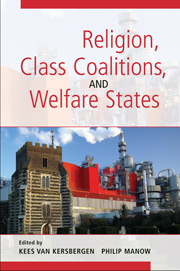Book contents
- Frontmatter
- Contents
- Preface
- List of Contributors
- 1 Religion and the Western Welfare State – The Theoretical Context
- 2 Western European Party Systems and the Religious Cleavage
- 3 The Religious Foundations of Work-Family Policies in Western Europe
- 4 Italy: A Christian Democratic or Clientelist Welfare State?
- 5 Religion and the Welfare State in the Netherlands
- 6 A Conservative Welfare State Regime without Christian Democracy? The French État-Providence, 1880–1960
- 7 Religion and the Consolidation of the Swiss Welfare State, 1848–1945
- 8 The Church as Nation? The Role of Religion in the Development of the Swedish Welfare State
- 9 The Religious Factor in U.S. Welfare State Politics
- 10 Religious Doctrines and Poor Relief: A Different Causal Pathway
- Index
2 - Western European Party Systems and the Religious Cleavage
Published online by Cambridge University Press: 28 January 2010
- Frontmatter
- Contents
- Preface
- List of Contributors
- 1 Religion and the Western Welfare State – The Theoretical Context
- 2 Western European Party Systems and the Religious Cleavage
- 3 The Religious Foundations of Work-Family Policies in Western Europe
- 4 Italy: A Christian Democratic or Clientelist Welfare State?
- 5 Religion and the Welfare State in the Netherlands
- 6 A Conservative Welfare State Regime without Christian Democracy? The French État-Providence, 1880–1960
- 7 Religion and the Consolidation of the Swiss Welfare State, 1848–1945
- 8 The Church as Nation? The Role of Religion in the Development of the Swedish Welfare State
- 9 The Religious Factor in U.S. Welfare State Politics
- 10 Religious Doctrines and Poor Relief: A Different Causal Pathway
- Index
Summary
Karl Marx has long cast his shadow over the study of European political development. Beginning with the appearance of Barrington Moore's classic The Social Origins of Dictatorship and Democracy, leading theorists of long-term political change in Western Europe have centered their analyses around class actors and coalitions. More recently, however, newer explorations of comparative party formation and consolidation have begun to take into account the central role played by religious conflict across the continent during the 19th and 20th centuries. Although such conflicts led to the creation of large and powerful ‘parties of religious defense’ in Germany, Austria, Switzerland, the Netherlands, Belgium, and Italy, no such parties emerged in Britain, France, the Iberian peninsula, or Scandinavia, despite high levels of religious tension there. Instead, in these latter cases, religious cleavages were absorbed into existing, often bipolar, party landscapes. As Philip Manow and Kees van Kersbergen argue in Chapter 1, such differences in party configuration with respect to religion, when combined with the effects of contrasting electoral regimes, go a long way toward explaining variations in welfare states found later in the 20th century. Building on the writings of Stein Rokkan and the more recent studies of Hans Righart, Stathis Kalyvas, and Andrew Gould, this contribution will attempt to account for the divergent ways in which both religion and class came to shape European party systems between the Congress of Vienna and World War II.
- Type
- Chapter
- Information
- Religion, Class Coalitions, and Welfare States , pp. 39 - 55Publisher: Cambridge University PressPrint publication year: 2009
- 15
- Cited by



